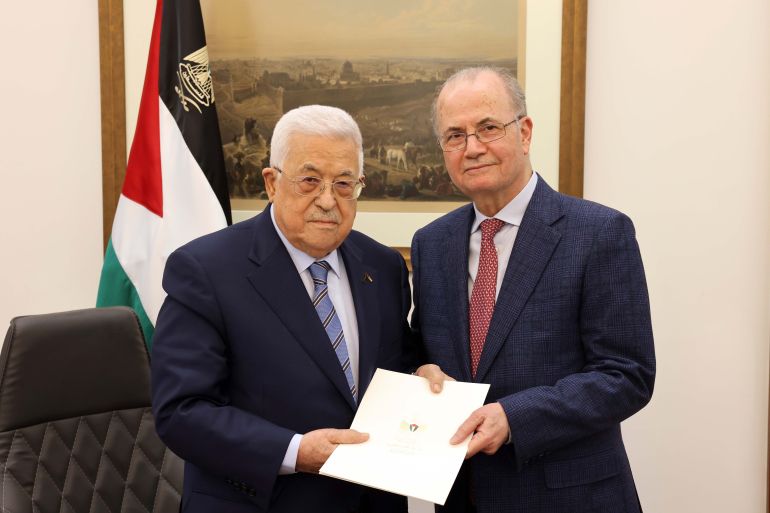Palestinian President Abbas appoints Mohammed Mustafa as prime minister
The move comes as the Palestinian Authority faces pressure to reform from the US amid Israel’s war on Gaza.

Palestinian President Mahmoud Abbas has appointed his longtime economic adviser Mohammed Mustafa to be the next prime minister in the face of US pressure to reform the Palestinian Authority as part of Washington’s post-war vision for Gaza.
Mustafa, a US-educated economist and political independent, now faces the task of forming a new government for the PA, which has limited powers in parts of the Israeli-occupied West Bank.
Keep reading
list of 4 items‘Death trap’: Israeli forces kill six in new attack on Gaza aid seekers
Israeli military admits mistaking bike for RPG in Gaza killing
US Senate leader calls for new elections in Israel
In a statement announcing the appointment on Thursday, Abbas asked Mustafa to put together plans to re-unify administration in the occupied West Bank and Gaza, lead reforms in the government, security services and economy and fight corruption.
Mustafa replaces former Prime Minister Mohammed Shtayyeh who, along with his government, resigned in February citing the need for change amid Israel’s war on Gaza and escalating violence in the occupied West Bank.
The internationally recognised PA, which is dominated by the Fatah party, exercises limited self-rule in the occupied West Bank, but lost control of Gaza to Hamas in 2007.
Aims to reunify governance of Palestinian lands after face major obstacles, including strong opposition from Israeli Prime Minister Benjamin Netanyahu, and a devastating war that is still grinding on with no end in sight.
Fatah and Hamas are expected to meet in Moscow this week for talks.
Mustafa, 69, has held senior positions at the World Bank and previously served as deputy prime minister and economy minister.
In 2015, Abbas appointed Mustafa as the chairman of the Palestine Investment Fund (PIF), which has nearly $1bn in assets and funds projects across the occupied Palestinian territory.
He served as a deputy prime minister responsible for economic affairs from 2013 to 2014, when he led a committee tasked with rebuilding Gaza after the seven-week war in which more than 2,100 Palestinians were killed.
Speaking at Davos in January, Mustafa said the “catastrophe and humanitarian impact” of Israel’s continuing war on Gaza was much greater than a decade ago.
At least 31,341 Palestinians have been killed in Gaza since October 7, most of its 2.3 million population have been displaced and are in desperate need of aid, and swaths of the enclave now lie in rubble.
Biden administration officials have urged Abbas to bring new blood, including technocrats and economic specialists, into a revamped PA to help govern post-war Gaza.
But it is unclear whether the appointment of a new cabinet led by a close Abbas ally would be sufficient to meet US demands for reform, as the 88-year-old president would remain in overall control.
Israel, meanwhile, has said it will never cooperate with any Palestinian government that refuses to reject Hamas and its October 7 attack on southern Israel.
Mustafa, in his Davos remarks, described the October 7 attack as “unfortunate for everybody”.
“But it’s also a symptom of a bigger problem … that the Palestinian people have been suffering for 75 years non-stop,” he said.
“Until today, we still believe that statehood for Palestinians is the way forward, so we hope that this time around we will be able to achieve that, so that all people in the region can live in security and peace.”